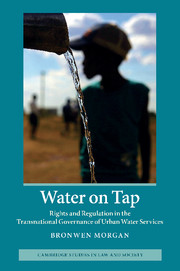Book contents
- Frontmatter
- Contents
- List of figures
- List of tables
- Acknowledgements
- Introduction: The field of global water policy: struggles over redistribution and recognition
- 1 Rights, regulation and disputing: a conflict-centred approach to transnational governance
- 2 Managed liberalisation and the dual face of French water services provision
- 3 ‘Another world is possible’: Bolivia and the emergence of a participatory public provision model for access to urban water services
- 4 Regulatory arbitrage and popcorn politics: contrasting disputing pathways in Argentina and Chile
- 5 Moonlight plumbers in comparative perspective: electoral v. constitutional politics of access to water in South Africa and New Zealand
- 6 Law's work: legality and identity in transnational spaces
- Epilogue
- References
- Index
- CAMBRIDGE STUDIES IN LAW AND SOCIETY
3 - ‘Another world is possible’: Bolivia and the emergence of a participatory public provision model for access to urban water services
Published online by Cambridge University Press: 03 May 2011
- Frontmatter
- Contents
- List of figures
- List of tables
- Acknowledgements
- Introduction: The field of global water policy: struggles over redistribution and recognition
- 1 Rights, regulation and disputing: a conflict-centred approach to transnational governance
- 2 Managed liberalisation and the dual face of French water services provision
- 3 ‘Another world is possible’: Bolivia and the emergence of a participatory public provision model for access to urban water services
- 4 Regulatory arbitrage and popcorn politics: contrasting disputing pathways in Argentina and Chile
- 5 Moonlight plumbers in comparative perspective: electoral v. constitutional politics of access to water in South Africa and New Zealand
- 6 Law's work: legality and identity in transnational spaces
- Epilogue
- References
- Index
- CAMBRIDGE STUDIES IN LAW AND SOCIETY
Summary
Introduction
This chapter tells the story of how a model of public participatory governance emerged from the actions of the Bolivian state and Bolivian actors as a response to the problem of access to water in the 1990s. As in the last chapter, it is told as an institutional story of changes over time in rights and regulation, illuminated by the contours of a particular dispute in Cochabamba involving the withdrawal of a large multinational company in the wake of serious and violent unrest. The dispute ignited long-simmering opposition by social movement activists to the gradual introduction within Bolivia of a managed liberalisation model of water service delivery policy. From the conflict emerged a public participatory model that combined pre-existing approaches to water resource use, particularly by rural and indigenous groups, with specific demands for social control and distributive equity. This model secured what seemed, in April 2000, to be a decisive victory, when the Bolivian state cancelled the concession contract with the multinational water company and enacted new water laws with substantial amendments proposed by social movement activists. And indeed the Cochabamba dispute is frequently characterised as ‘a victory of human rights over corporate rights’, an outcome that retains an iconic emblematic power in the broader global narrative on the politics of access to water.
- Type
- Chapter
- Information
- Water on TapRights and Regulation in the Transnational Governance of Urban Water Services, pp. 85 - 117Publisher: Cambridge University PressPrint publication year: 2011

